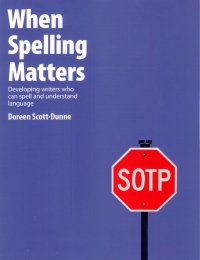| ________________
CM . . .
. Volume XIX Number 39. . . .June 7, 2013
excerpt:
Doreen Scott-Dunne’s passion for teaching students how to investigate words is evident in the excerpt above and throughout this book of practical teaching ideas. When Spelling Matters is divided into eight chapters that progress from the basics of phonological knowledge to the importance of writing in context and embracing technology to facilitate student writing. Scott-Dunne’s approach to “teaching students how to spell” is clearly stated in the introduction as “manifesting a love of words.” There are no spelling lists to memorize and no weekly spelling tests of frequent words; instead, she advocates creating opportunities for inquiry into word patterns along with many opportunities to write and think and solve word problems. Inquiries have students identifying word structure patterns, noticing, wondering, and questioning, from noticing in grade 1 that all words have a vowel, to questioning why paid would go in the ai column in a word sort, but not said, in grade 5. Most of the student examples are from grades one to 6, with a brief reference to grade 7. The chapter content follows the increasing levels of understanding expected from English Language Arts outcomes in Kindergarten to grade 8, moving from clapping out syllables to investigating foreign roots of words and specialized vocabulary in Social Studies and Science. Teachers are provided with definitions of the foundational terms of English language knowledge systems along with developmental charts to guide them in assessing where their particular students are in their word knowledge. These charts provide clear continuums and enough examples to plan learning activities. Together with the websites and suggested books, teachers will have the language, knowledge, and resources necessary to guide student inquiry, and to “create writers who want to write and not spellers who don’t care to write.” While the most common spelling rules or guidelines are discussed, the advocated approach is for teachers to use this information to set students up for inquiry and investigations so they have the understanding to articulate the rules and exceptions rather than to be told to memorize the rules. Scott-Dunne, who has a master’s degree in spelling, has combined her knowledge, her love of words, and her experience with educating both elementary students and teachers to create a resource rich in creative ideas and student writing examples. Her creative ideas to build word knowledge include raps or chants, games such as Base Word Baseball, poetry riddles, writing jokes with puns and multiple meanings, and exploring different cultural versions of common idioms. As student spelling consciousness grows, teachers are provided with ideas to move students away from literal meanings to more expressive figurative language by exploring metaphors and other literary devices to help students find the right words to communicate what they wish to say. A key component of student spelling consciousness is a growth in their ability to revise and edit their writing. Examples of specific revision and editing checklists are provided and should be based on the ongoing word investigations in which students are engaged. Student application of their learning is the ultimate goal of this book, and the final chapter solidifies this stance, discussing how and why writing is always the context for spelling. Along with ideas for establishing a purpose for writing and providing specific feedback, the use of various digital platforms (i.e. Prezi versus Crocodoc) and social networking tools useful for writing and editing are discussed. The reference to the use of various mentor texts used to provide exemplars could be expanded to include examples of a teacher’s own writing. Modeling writing in front of our students is powerful teaching and more genuine and honest than telling them “writing is not always easy.” This excellent book is a “must read” for every teacher who wishes to expand her/his repertoire of teaching strategies to develop critically thoughtful students who love investigating words. Highly Recommended. Betty Klassen teaches in the Faculty of Education in the Middle Years Program at the University of Manitoba in Winnipeg, MB.
To comment
on this title or this review, send mail to cm@umanitoba.ca.
Copyright © the Manitoba Library Association. Reproduction for personal
use is permitted only if this copyright notice is maintained. Any
other reproduction is prohibited without permission.
NEXT REVIEW |
TABLE OF CONTENTS FOR THIS ISSUE
- June 7, 2013.
AUTHORS |
TITLES |
MEDIA REVIEWS |
PROFILES |
BACK ISSUES |
SEARCH |
CMARCHIVE |
HOME |
